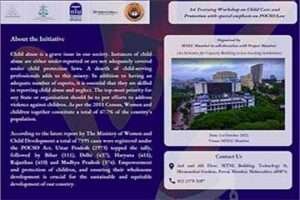CBLT – International Conference on Insolvency and Bankruptcy Law: Challenges and Opportunities
Table of Contents
- About the RGNUL, Punjab
- About the Centre for Business Laws & Taxation (CBLT)
- About the Insolvency and Bankruptcy Law Division
- About the Conference
- Illustrative List of Topics
- Registration Details
- Important Dates
- Submission Guideline
About the RGNUL, Punjab
The Rajiv Gandhi National University of Law (RGNUL), Punjab, was established by the State Legislature of Punjab. The Act incorporated a University of Law of national stature in Punjab to fulfill the need for a Centre of Excellence in legal education in the modern era of globalization and liberalization. Recently, the University has earned the coveted status of being one of the top-ranking law teaching institutions in the Country. Over 1000 students acquire state-of-the-art legal education in a well-furnished and fully developed residential campus which boasts of all necessary infrastructural and manpower facilities for the all-around growth of the students. RGNUL is currently emphasizing research, training, and consultancy in various areas of contemporary interest. It is envisaged to be a research-intensive university in the times to come.
About the Centre for Business Laws & Taxation (CBLT)
The Centre for Business Laws and Taxation (CBLT) is one of the Rajiv Gandhi National University of Law, Punjab’s flagship centres. The Centre aims to further its objective of bridging the gap between the theory and practice of corporate law. It is established to promote comparative research and discussion in corporate law. It focuses on analyzing current policy approaches in various areas of corporate laws such as corporate governance, insolvency law, mergers and acquisitions, taxation, etc. It plans to streamline the process of learning through academic courses, programs, and publications. It also focuses on identifying the gaps between industry and academia through effective joint research. The Centre follows a multi-disciplinary approach to recognizing problems in the field of corporate laws and endeavours to engage in dialogue to facilitate changes in it. It is based on establishing a culture of discussion on corporate laws in the country by educating the next generation of lawyers and law students.
About the Insolvency and Bankruptcy Law Division
The IBLD is a specialized division with a singular focus on restructuring and insolvency laws in India and beyond. Recognizing the growing importance of this specialized legal area, IBLD aims to deepen understanding, foster research, and contribute to the development of effective insolvency practices. By bringing together experts, scholars, and practitioners, the IBLD will be at the forefront of exploring the complexities of insolvency law and its impact on the business landscape. To achieve these objectives, IBLD conducts a range of academic and professional activities including credit courses, public lectures, and roundtables. It actively collaborates with key governmental and quasi-governmental institutions such as the Insolvency and Bankruptcy Board of India (IBBI), National E-Governance Services Ltd. (NeSL), and other stakeholders. Additionally, the division publishes scholarly and policy-oriented pieces, contributing to both academic discourse and practical reform in the field.
About the Conference
The Two-Day International Conference on The Insolvency and Bankruptcy Law: Challenges and Opportunities is designed to provide an in-depth exploration of the evolving insolvency landscape in India and beyond. This conference aims to bridge the gap between practice and theory and bring together professionals, researchers, and students with practical knowledge and insights to discuss critical aspects of insolvency practice.
Illustrative List of Topics
- Group Insolvency
- Mediation in Insolvency
- Cross-Border Insolvency
- ESG and Insolvency and Bankruptcy
- Pre-packaged Insolvency
- PUFE Transactions
- Use of Technology for Enhancing Process Efficiency
- Personal Guarantors under the IBC
- Interplay of the IBC with Other Laws
- Comparison of IBC with Global Practices
- Sectoral Analysis of Effectiveness of IBC
- Information Utility
- Study of Geo-Politic Situations Leading to Insolvency of Export-based Companies
- Measuring the Impact of the IBC on Corporate Finance, Debt and Equity Market
- Balancing Interests of Stakeholders under Processes under the Code
- Effectiveness of the IBC Processes vis-à-vis other Options for Resolution and Recovery
- Developing Market for Stressed Assets
- Going Concern Sale in Liquidation Process
- Insolvency Framework for MSME
Please note that the above topics are merely indicative and participants are allowed to explore any topic related to the main theme.
Registration Details
Registration Fee – 750/- + GST and INR 500/- + GST (in case of co-authors) for Students, Researchers, Academicians, Insolvency Professionals, Advocates and other stakeholders.Payment and Registration Link for the Conference can be found here.
Important Dates
Last Date for Abstract Submission – 30th June 2025
Last Date for Full Paper Submission – 31st July 2025
Last Date for Registration and Fees Payment – 10th August 2025
The link for the abstract submission can be found here.
Submission Guideline
- An abstract of 300–400 words must be submitted on or before June 30, 2025.
- The abstract should clearly mention the title, central idea, structure, and key conclusions of the paper, highlighting its novelty, usefulness, and specific contribution to existing literature. It must include the name(s), designation, email ID, and contact number of the author(s).
- Co-authorship is allowed for research papers, with a maximum of two authors.
- For full paper submission, the following format must be followed – Title: Times New Roman, 14 points, BOLD CAPS, centered; Text: Times New Roman, 12 points, 1.5 spacing, justified; Footnotes: Times New Roman, 10 points, single spacing, justified.
- All citations must strictly follow Bluebook (20th Edition) for the conference paper submissions.
- Submissions must be original and unpublished work of the author(s), with strict zero-tolerance towards plagiarism or use of AI tools, which will result in immediate rejection.
- Selected papers may be published at the discretion of the University. The decision of the University in this matter shall be final and binding. Only those papers which are submitted within the prescribed time-line shall be considered for publication.
For any queries, please feel free to contact the undersigned –
Mr. Harsh Bansal
(+91) 7840097272
Mr. Akshat Verma
(+91) 7004654335




